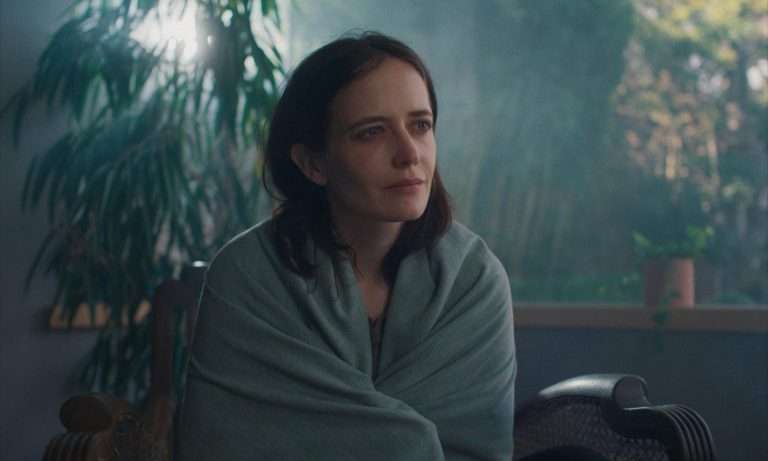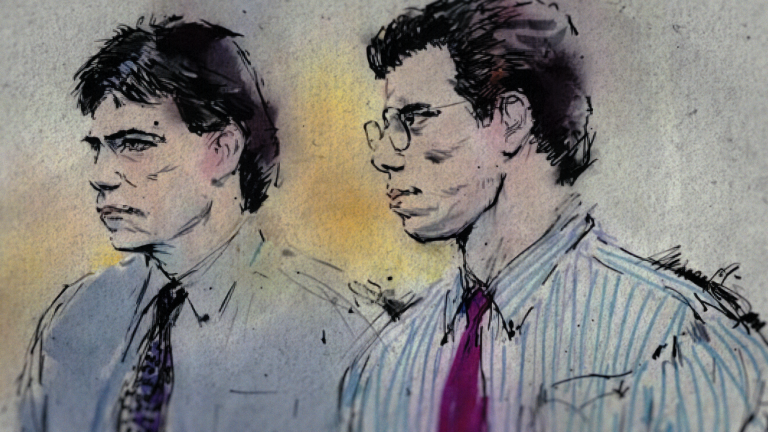The first of two projects dealing with the BBC’s “Scoop of the Decade,” “Scoop” (2024) is a biographical film directed by Philip Martin. It deals with the events leading up to the securing of the interview between Emily Maitlis and Prince Andrew, the Duke of York, as well as the dramatization of the interview itself, which, through Andrew’s non-tacit admission, revealed his relationship with the convicted pedophile Jeffrey Epstein.
Scoop (2024) Plot Summary and Movie Synopsis:
The movie opens in New York, where beleaguered Jae Donnelly (Connor Swindelis), a paparazzi, gets called for an early morning stakeout outside one of Jeffrey Epstein’s houses. Both Donnelly and his partner notice the guards and suspect that Prince Andrew might be inside as well. They also see a young girl, no less than 20 years old, walk out of the house with the guards not even acknowledging her behavior, leading them to the realization that she is a regular. However, Donnelly strikes gold when he witnesses Epstein and Prince Andrew (Rufus Sewell) exit Epstein’s house and go out for a morning stroll towards Central Park.
Donnelly tries to click a photo but is unable to capture Andrew’s visage for posterity. He cuts through the park, runs over a fence, and hides over a rock face, waiting for the two of them to walk up by the park road. He manages to click photos in rapid succession, finally capturing the photo of Andrew and Epstein walking together through the park, deep in thought, which becomes the defining depiction of Andrew’s relationship with Epstein that resurfaces nine years later.
While the movie deals with the interview and how Maitlis conducts the interview, the central players are two women on opposite ends of the fence. The first is an interview booker for the BBC’s Newsnight. Sam McAllister here played with a determined and somewhat cocksure Billie Piper. McAllister used to work for the Daily Mail, and her residual combative nature, her dogged pursuit of story threads, and getting her story on the front of the byline put her at odds with the rest of her colleagues at Newsnight.
Her plan to include a story featuring Lupita Nyongo emphatically conversing about colorism is shut down because it doesn’t fit the immediacy of the news, especially front-page material. We are also given a cursory glance at McAllister’s family life, her struggle as a working single mother, and her loving relationship with her mother, who doesn’t hold back in advising her when McAllister is drowning in doubt and self-defeat.
The second important woman on the opposite end of the fence is Prince Andrew’s private secretary, Amanda Thirsk (Keeley Hawes). Thirsk, in this movie, is shown to have completely drunk the Kool-Aid, which is the charisma of Andrew and the Royal family. She shares admiration for Andrew and tries to weaponize the charm that Andrew had shown while conversing with young entrepreneurs about his Pitch@Palace idea, which would be a royal version of The Apprentice. However, when Donnelly’s picture suddenly resurfaces nine years later, it restarts the speculation about the length of Andrew’s involvement with Epstein.
To clean his image, Thirsk has the right idea of sending out an email to McAllister, asking her to catch up and discuss whether an interview would be possible. With the bomb about Epstein not yet dropped in the wild, Mcallister calls up Donnelly to satisfy her curiosity. Donnelly informs her about Ghislaine Maxwell, Epstein’s girlfriend, whom Andrew had also been photographed with and who Donnelly believes had been instrumental in Epstein’s dealings.
McAllister doggedly pursues all avenues, trying to build a rapport with Thirsk and playing into Thirsk’s misgivings about the press-friendly strategy that had been applied by the new press officer in charge of Andrew’s office. McAllister truly believed that she had come close to securing an interview with Thirsk before Thirsk folded like a praying mantis and walked off. It’s a frustration that Mcallister carries with her, considering that her journalistic values clash with the classism present within the BBC, and thus her colleagues chafe at McAllister’s abrasive nature, none less than Maitlis (Gillian Anderson) herself, though she is too sophisticated to openly acknowledge.
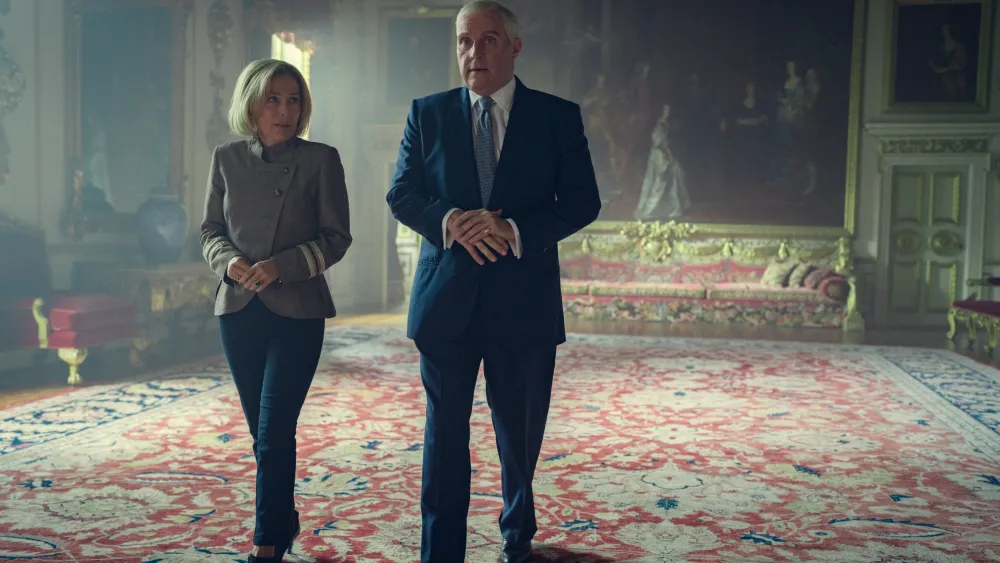
However, both Esme Wren, McAllister’s boss, and Amanda Thirsk start taking the concept of an actual interview much more seriously when McAllister tensely informs the two of them late at night after receiving a tip from Donnelly that Epstein would be arrested on charges of sex trafficking by the FBI. It’s almost waiting for the inevitable because news eventually starts trickling out about Andrew’s involvement with Epstein. The three women are finally allowed to negotiate with Prince Andrew about an interview.
It is in that negotiation session that the dominoes slowly start to fall. Sewell’s portrayal of Andrew shows a man imbued with a dry wit, but there is also a very creepy emotional stuntedness within the man, depicted by his obsession with soft toys and their placement on his bed. To ensure that Andrew won’t be caught off-guard, Thirsk arranges for Andrew to attend the negotiation meeting with Princess Beatrice, which puts both McAllister and Maitlis on the defensive, Maitlis especially so. However, she forcefully refuses to reveal the questionnaire, and finally, McAllister takes the reins, convincing the plaintiffs at the opposite end of the table that the prince doesn’t need a sympathetic interviewer, as the public perception regarding Andrew is already in the doldrums. Instead, he requires a platform whereby he would be allowed to speak his mind unfiltered.
The problem and what they are hoping for is his unfiltered mind landing Andrew in favor. And there are many instances where, contrary to connecting with the youth, Andrew is the farthest from being one—not paying attention to Twitter, joking about his connection to Jimmy Savile being far more juicier than his association with Epstein. And because of this blase temperament that comes from a position of privilege and power being unchecked, Maitlis, too, rehearses her questions with her colleagues in a similarly combative fashion. They all agree that Andrew acknowledging his misdeeds would result in jail time, and it would be better to come at him hard with facts.
Upon being asked about her combative strategy, Maitlis reveals she is doing that because she regrets not having asked Clinton about Monica Lewinsky when she interviewed him. This is in response to Maitlis identifying Lewinsky’s dress in the photos and manifests that were recovered from Epstein’s estates. When pointed out that their relationship had been consensual, Maitlis retorts that it had still been an abuse of power.
Ultimately, McAllister (according to the memoir from which the movie is based) inspires Maitlis to take a step back, reminding her that men like these love to have their “voices heard,” and hopefully, that would cause him to slip up. From the rehearsal perspective of Andrew’s team, we witness him having trouble with the necessary political correctness required for appearing in the Newsnight broadcast. As for whether Andrew should move forward with this broadcast in the first place, Shirk’s fears are assuaged by Andrew stating that the queen’s mother trusts her favorite son (though not so much because she sends her press office head to the broadcast to record the interview).
Scoop (2024) Movie Ending Explained:
What does Prince Andrew reveal in the interview?
The interview was held on November 14th, 2019, at Buckingham Palace. Emily Maitlis opens the questioning much more gingerly, leaving the tapestry wide open for Andrew to spin his yarn. Andrew revealed that he doesn’t regret his friendship with Epstein, conceding that the parties that would occur or the people that he would have the chance to interact with would prove to be useful. He emphatically denies having any sexual relationship with Virginia Roberts, even as Maitlis points out in Roberts’ statement mentioning the two of them having dinner and dancing back in 2001, which he also categorically rejects. But as questions start to mount up with deliberate pauses, we see Andrew slowly getting flustered.
He denies having met or danced with Roberts at Tramps Bar, emphatically pointing out that he hadn’t been sweaty because, after the Falklands War, Andrew had lost the ability to sweat due to the oversecretion of adrenaline. As an alibi, he brings up the infamous event of attending a party at PizzaExpress in Woking, which, in his own words, would be highly unusual, and that is why he remembers it.
When asked about staying in Epstein’s manor in December 2010, he admitted to it. When asked constantly, pointing out that it hadn’t been but three days after Epstein had been convicted of sexual offenses against a minor, Andrew, in a tone-deaf fashion, answered that it had been out of convenience. He doubles down on that tone-deafness, stating that he regrets that because that is unbecoming of a member of the royal family and that he had let the “side down.” He also points out that the sole purpose of his meeting with Epstein was to break off their friendship.
What was the aftermath of the interview?
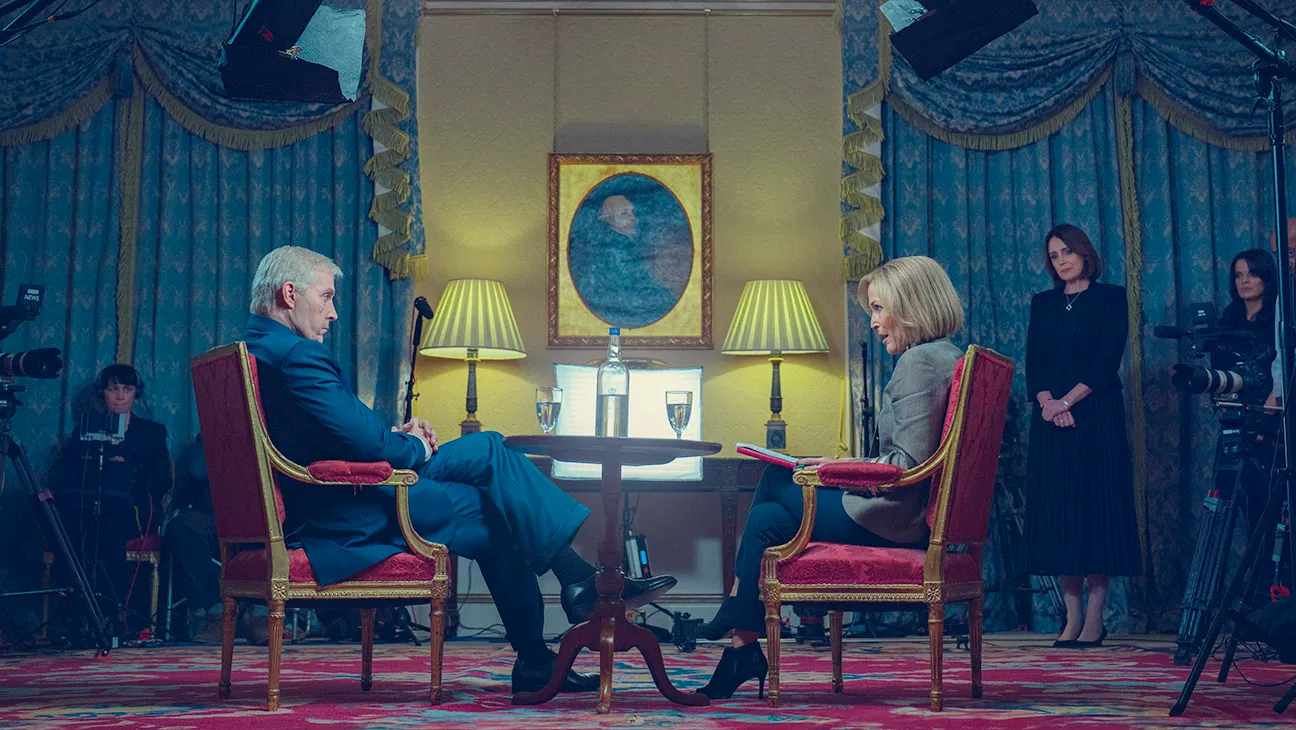
For the tone-deaf members of Prince Andrew’s cadre, like Andrew and Thirsk, the interview had been a smashing success. For the members of Newsnight, which would be broadcast on November 16, 2019, it turned out to be a rating juggernaut. While the movie takes creative liberties in highlighting the budget cuts and layoffs that BBC had implemented in 2020 and brought them forward to 2019, it allowed for the impact of the interview to reverberate more. The interview would be awarded five journalism awards, but the bigger impact occurred on social media, where the interview went viral.
In the court of public opinion, Andrew’s words and reactions would be twisted into memes, and his statements would be taken as further proof of the lack of remorse and the systematic abuse of power that makes such events blase for those in higher authority. But more importantly, for Buckingham Palace, this interview would be a historic PR disaster. The Palace issued a communiqué stating that Prince Andrew would be suspending his duties for the foreseeable future, he would be stripped of his ranks, and it would also be insisted that the Duke had sympathy for the victims and would cooperate to ensure that justice would be done for the remainder of the victims.
As the movie ends and we see the long-reaching effects of the interview and the British public handily rejecting Andrew’s self-absorbed royalist tendencies, we realize that the apology had been published too late. The die had been cast. The movie ends with McAllister strolling out of the office, smiling, understanding, and realizing her place in the hierarchy of the system, bolstered by an inspiring speech from Esme Wren about a job well done, as well as being publicly acknowledged on Twitter.
Scoop (2024) Movie Review:
There has been a renewed sense of interest in the Royal family, from the popularity of the television series “The Crown” on Netflix to the actual interview and its far-reaching consequences being felt even today, and just recently, the Kate Middleton debacle and how social media, as well as the print media, collectively would devolve into hungry spectators, so open to witnessing the royals being brought down.
“Scoop” demonstrates that given Prince Andrew’s predilections, the populace’s outrage may feel legitimate. Sewell’s acting as Andrew communicates the underlying menace beneath the character’s obtuseness, a sheen of arrogance concealing emotional stunting, a lack of empathy, and guilt. “Scoop” features a fairly strong ensemble cast, with Billie Piper as Sam McAllister leading the way. However, as a result, Anderson, Newsnight’s superwoman, is kept in the background, virtually untouchable, an ideal to be idolized, until Epstein is apprehended and Andrew’s involvement is eventually revealed.
It would be a wise screenplay decision not to allow Anderson as Maitlis to take center stage until the beginning of the second act. Still, screenwriter Peter Moffat deserves credit for balancing the focus between McAllister and Maitlis so that none of their contributions are eclipsed in the process. Hawes is also excellent in a very understated role as Prince Andrew’s naive private secretary, who, as the film begins and introduces us to the Duke of York, almost lulls us into a false sense of security by showing us through her eyes, allowing us to understand her loyalty, before gradually chipping away at that illusion.
Despite all of these minor nuances in human interactions, Scoop exudes an aura of inevitability that completely undermines any suspense or dramatic heft. There is no sense of tension or danger for any of the characters, and if the struggle had to be internalized, it might have been constructed far more effectively. Movies depicting the far-reaching impacts of well-researched journalism rely on subdued graphics, but striking the right balance is difficult.
“Scoop” fails to convey the immediacy of the crisis on screen while also emphasizing the importance of the interview as a means of Andrew’s fall from grace in the face of public opinion. That would only become evident after the interview, and by then, the film rushes towards the end. It makes the events of the interview feel stiff rather than compelling, failing to call back to its clearest inspiration – “Frost Nixon.” It leaves you wondering if viewing the actual interview on YouTube would have been a wiser choice.




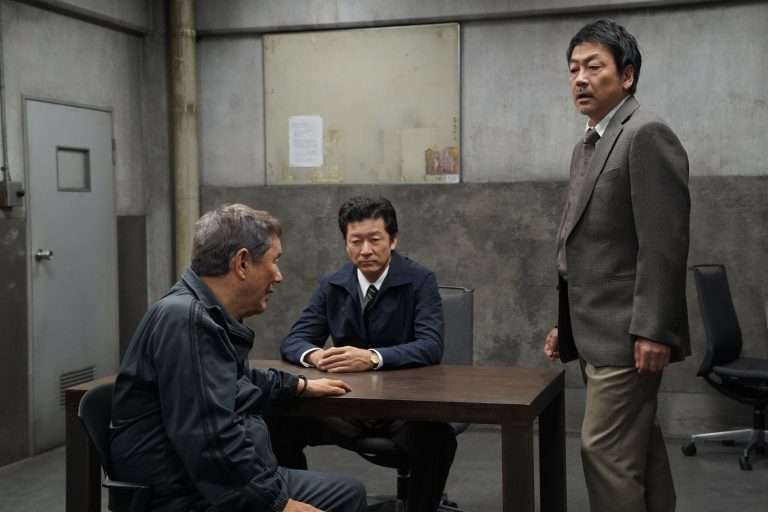
![The Peanut Butter Falcon [2019]: ‘BFI-LFF’ Review – A funfair Caterpillar ride](https://79468c92.delivery.rocketcdn.me/wp-content/uploads/2019/10/peanut-butter-falcon-review-768x512.jpg)

